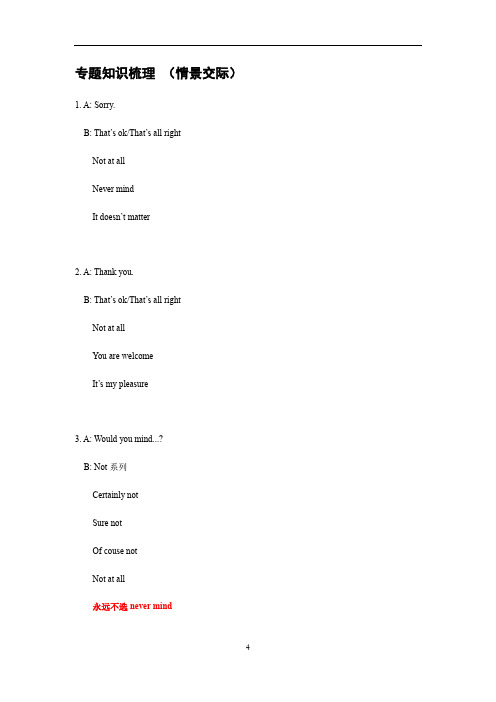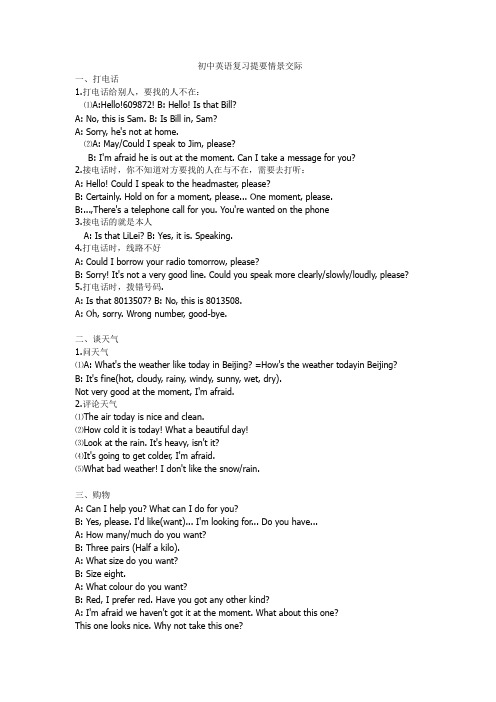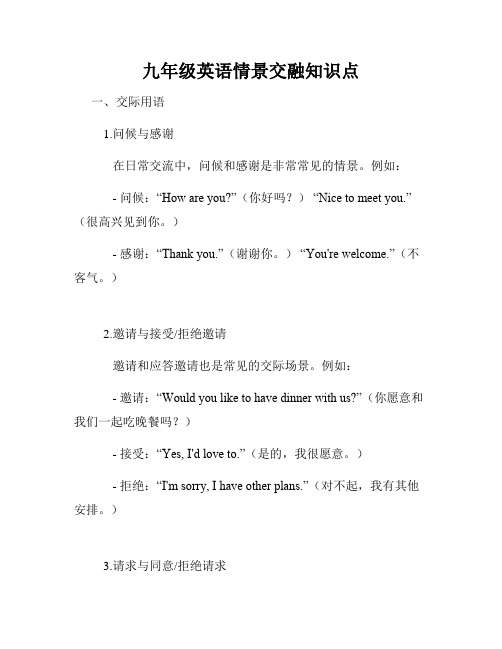中考英语复习考点《情景交际》
中考英语复习—— 情景交际专题讲解及练习(有答案)

专题知识梳理(情景交际)1. A: Sorry.B: That’s ok/That’s all rightNot at allNever mindIt doesn’t matter2. A: Thank you.B: That’s ok/That’s all rightNot at allYou are welcomeIt’s my pleasure3. A: Would you mind...?B: Not系列Certainly notSure notOf couse notNot at all永远不选never mind4. A: Can you do me a favor?B: With pleauseA: Thank youB: It’s my pleause.5. A: Would you like me to...?Would you like some tea?(主动帮忙)B: Yes, please.No, thanks.6. A: Would you to join us?(邀请某人做某事)B: Yes, I’d(like/love to).No, I wouldn’t (like/love to).7. That’s all right.没关系;不客气That’s right. 那是对的All right. 好的8. A: May I ...?B: Go ahead.Here you are.Of course you can.Sorry, you can’t9. A: I have a complaint about ..?B: What’s your trouble?What’s the matter?10. A: Jossie, don’t be later ?B: I won’t二、专题精讲1. ---Would you like to go out for a walk with us?---_________, but I must finish my homework first.A. Of course notB. That’s all rightC. I’d love toD. Yes, I do【解析】答案:C。
中考英语复习知识点部分14情景交际部分

5
五、就医、就餐与购物
(1)就医:
情
景
医生(yīshēng)说的话: What's wrong with you?/ What's the matter
(qíngjǐng)
with you?/ How long have you been like this? / Take this
medicine three times a day./ Nothing serious.等
12/10/2021
第一页,共十五页。
一、建议、劝告(quàngào)及应答
情
建议:Why not do sth.?/ Let's do sth. Shall I / we do
景
sth.?
Will/Would you like do sth.?
Will/Would
(qíngjǐng)
you like sth.…? How/What about doing sth.?
交
病人说的话:I've got a headache/ fever / cold./ I don't feel
际
well. / I am not feeling well./ There is something wrong
with…for…days等。
12/10/2021
第七页,共十五页。
5
五、就医、就餐与购物
( A )1.—Hurry up, or we will miss the sea lion show in the Ocean Park. —________. We still have fifteen minutes before the show begins. (2015广东省卷)
情景交际知识点详解(初中英语专项复习)1

情景交际知识点详解(初中英语专项复习)考点一问候、告别初次见面可说:Hi. Hello. /How do you do? /Good morning/afternoon/evening.回答也用相同的话语;朋友见面可说:How are you? 回答可说:Fine, thank you, and you? 见面说:How’s everything?回答可说:Very well, thank you. /Just so-so.见面说:Give my regards to your parents. /Please remember me to your parents.回答可说:Sure. /All right. /I’ll do that. Thank you.等。
常见的告别用语有:Goodbye.(Good-bye.), /Bye-bye. Bye. /See you. See you later. /See you tomorrow. /Good night.等。
1. —Hello! How are you?— _________________.A. Who are you?B. I am fine, thank you. And you?C. How do you do?D. Nice to meet you.【答案】B【解析】这是熟人见面时的问候语。
故选B。
2. —How is everything going?—_______.A. Everything is finishedB. Nothing has been doneC. Not so bad, you knowD. Not doing wrong, you see【答案】C【解析】这是见面时的问候语,询问对方的近况,故选C。
考点二感谢、道歉当别人为你做了事、帮了忙、让路、指路、送你礼物赞美你等,你都应表示感谢,可说:Thank you (very much). /Thanks a lot. /It’s very kind of you.等。
中考复习初中英语情景交际知识点大全

初中英语情景交际知识点大全日常交际用语情景大全一、打电话(Makingphonecalls)1、请给某人/某单位打电话。
Would/could/canyouringup...?请你...打电话好吧?句中ringup意思是"给某人打电话"。
除了用ringup外,还可用call,callup,telephone等,意思相同。
canyou...?用得最普通;could/wouldyou...?用在正式场合,比较礼貌。
2、电话拨不通时常说:Thelineisbusy.Ican'tgetthrough.电话占线,我打不通。
/I'lltryagainlater.我过一会儿再打。
其中line指电话线路,getthrough指接通电话。
3、电话拨通后相互打招呼:Hello,(nameortelephonenumber)你好,(并通报本人的姓名或单位名称或电话号码)Hello,isthat...speaking?你是...吗?/Whoisthatspeaking/calling?你是谁?/Whoisspeaking/calling,please?你是谁?应答时常说:Yes,(thisis)...speaking.是的,我是...。
/Yes,it's...here.我是...。
4、打电话请对方找人或留言:Is...in/athome?某某在家吗?/Can/may/couldIspeakto...,please?请...接电话好吗?/Will/wouldyougiveamessageto...,please?请给...捎个口信好吗?/Wouldyoutellhimmytelephonenumber,please?请你把我的电话号码告诉他好吗?/Can/couldyouask...toringmeback,please?请叫...给我回个电话好吗?应答时常说:Holdon/Waitaminute/Onemoment,please.请等一等。
英语人教版九年级全册中考总复习情境交际

初中英语复习提要情景交际一、打电话1.打电话给别人,要找的人不在:⑴A:Hello!609872! B: Hello! Is that Bill?A: No, this is Sam. B: Is Bill in, Sam?A: Sorry, he's not at home.⑵A: May/Could I speak to Jim, please?B: I'm afraid he is out at the moment. Can I take a message for you?2.接电话时,你不知道对方要找的人在与不在,需要去打听:A: Hello! Could I speak to the headmaster, please?B: Certainly. Hold on for a moment, please... One moment, please.B:...,There's a telephone call for you. You're wanted on the phone3.接电话的就是本人A: Is that LiLei? B: Yes, it is. Speaking.4.打电话时,线路不好A: Could I borrow your radio tomorrow, please?B: Sorry! It's not a very good line. Could you speak more clearly/slowly/loudly, please?5.打电话时,拨错号码.A: Is that 8013507? B: No, this is 8013508.A: Oh, sorry. Wrong number, good-bye.二、谈天气1.问天气⑴A: What's the weather like today in Beijing? =How's the weather todayin Beijing? B: It's fine(hot, cloudy, rainy, windy, sunny, wet, dry).Not very good at the moment, I'm afraid.2.评论天气⑴The air today is nice and clean.⑵How cold it is today! What a beautiful day!⑶Look at the rain. It's heavy, isn't it?⑷It's going to get colder, I'm afraid.⑸What bad weather! I don't like the snow/rain.三、购物A: Can I help you? What can I do for you?B: Yes, please. I'd like(want)... I'm looking for... Do you have...A: How many/much do you want?B: Three pairs (Half a kilo).A: What size do you want?B: Size eight.A: What colour do you want?B: Red, I prefer red. Have you got any other kind?A: I'm afraid we haven't got it at the moment. What about this one?This one looks nice. Why not take this one?B: It's great, but it's not cheap enough. I like it, but it costs too much.How much is it? =How much does it cost?A: Thirty-five yuan.B: Can I try it on, please?A: Certainly.B: That's fine. I'll get/take/buy it.A: OK. Here you are.四、问路A1.Excuse me. Is there a ... near here?2.Excuse me. Where's the (nearest) ...?3.How can I get to...?4.Can you tell me the way to ...?5.Which is the way to...?B1.Yes, there is. (No, there isn't. sorry, I don't know).2.It's next to (outside, in front of)...3.Go down(along)this street.4.It's ... kilometres along ...on the right.5.It's about ... metres away/from here.6.Turn right/left at the first crossing (turning).=Take the first turning on the right/left.7.Go up this road to the end. It's on the corner of the street.How can I get there? Which number do I need, please?五、就餐A: What would you like to have?B: I'd like some...A: Would you like something to eat/drink...? What about...?B: Yes, please. No, thanks.A: Would you like some more...?B: Yes, please. Thank you. No, thanks. I'm full. (I've had enough) Just a little, please. A: Which do you like better, A or B?B:I like A better.或Either is OK. Neither, thanks.A: Which do you like best A,B or C?B:I like C best.A: Please help yourself to some...B: Thank you.六、看病1.Doctor: What's your trouble? What's wrong with you?What's the matter with you? How long have you been like this?Let me take your temperature.Try this medicine. Drink plenty of water and have a good rest.It's nothing serious. You'll be all right/well soon.2.Patient :There's something wrong with...I've got a cough.(cold/headache...)I'm not feeling well.(I feel terrible)My leg hurts. I've got a pain here.练习:完成对话:(一)Mr Green: Hello! Could I speak to the headmaster, please?Teacher: (1) ___ (2)___for a moment, please. Mr Black, there's a (3)___ for you.Mr Black: Hello!Mr Green: (4) ____ (5) _____ Mr Black?Mr Black: Yes, speaking.Mr Green: Good morning, Mr Black. This is Jim Green. I'm sorry. I'm (6)_____I won't be able to come to the parents' meeting this Friday. I have to be very (7)_that day.Mr Black: It(8)___(9)____. But you'd better come to our school some (10) ___ time.(二)A: Excuse me. Can you tell me the w_____(1) to Art Museum, please?B: Yes. Walk straight a_____(2) this road, and take the first t____(3) on the left.Then walk on u_____ (4) you come to a river.A:A river?思考题:A: What's w_____ with you? You don't look well, Mary.B:I have a bad cold.A:S______ to hear that. Have you seen the doctor?B: Yes, I have. He told me to take some m_____ and stay at home for a few days.A: But w_____ are you here at school? The doctor is right. You n___ some rest.B: I'm a_____ I'll miss too many of my l_____.A: Don't w_____ . Take care of yourself. I can help you when you are w_____ again. B: That's very k_____ of you.。
九年级英语情景交融知识点

九年级英语情景交融知识点一、交际用语1.问候与感谢在日常交流中,问候和感谢是非常常见的情景。
例如: - 问候:“How are you?”(你好吗?)“Nice to meet you.”(很高兴见到你。
)- 感谢:“Thank you.”(谢谢你。
)“You're welcome.”(不客气。
)2.邀请与接受/拒绝邀请邀请和应答邀请也是常见的交际场景。
例如: - 邀请:“Would you like to have dinner with us?”(你愿意和我们一起吃晚餐吗?)- 接受:“Yes, I'd love to.”(是的,我很愿意。
)- 拒绝:“I'm sorry, I have other plans.”(对不起,我有其他安排。
)3.请求与同意/拒绝请求在一些情景下,我们需要请求别人的帮助或者请求别人做某件事情。
例如:- 请求:“Could you please help me carry this heavy box?”(你能帮我搬这个重箱子吗?)- 同意:“Sure, no problem.”(当然,没问题。
)- 拒绝:“I'm sorry, I'm busy right now.”(对不起,我现在很忙。
)4.表达意见与建议当我们需要表达自己的意见或给予他人建议时,也需要使用相关的交际用语。
例如:- 表达意见:“In my opinion, this movie is very interesting.”(依我之见,这部电影很有趣。
)- 给予建议:“You should study harder if you want to improve your grades.”(如果你想提高成绩,你应该更加努力学习。
)二、日常对话1.购物场景在购物场景中,我们需要进行商品询问、试穿、购买等操作。
例如:- 询问:“Excuse me, do you have this T-shirt in a smaller size?”(打扰一下,请问这件T恤有尺码更小号的吗?)- 试穿:“Can I try on this pair of shoes?”(我可以试穿这双鞋吗?)- 购买:“I'll take two of these, please.”(请给我两个这个。
中考英语总复习——情景交际

中考英语总复习———情景交际湖北武汉邓杨周情景交际是历年中考常考的内容,常涉及听力题、单项选择题、补全对话题等题型。
通常是通过上下文情景设置来考查交际用语本身或者其它语法项目。
同学们一定要熟悉日常交际用语及对话话题,尤其是英语教学大纲中要求的话题及常用习惯用语。
要注意不要用中式思维来答题,应根据语言环境具体问题具体分析。
现简要总结中考英语中常考的几种话题和交际用语如下:1.Can I help you?(这是商店、饭店、书店等服务业的服务人员对顾客说的一句客套话。
类似的句型还有:What can I do for you?Is there anything I can do for you?Anything I can do for you?肯定回答(接受帮助):Yes,please.(是的。
)否定回答(拒绝帮助):No,thanks.I ’m just looking around.(不了,谢谢。
我只是随便看看。
)2.Here,take this seat please.(请坐。
)3.Would you like some water?(您需要水吗?)4.Let me take your bags.(我来帮你拿包。
)对2、3、4的肯定的回答(接受帮助)可以用:Thanks.That would be nice.(谢谢。
那样太好了。
)Thank you for your help.(感谢你的帮助。
)Yes,please.(是的。
)对2、3、4的否定的回答(拒绝帮助)可以用:No,thanks.(不了,谢谢。
)That ’s very kind of you,but I can do/manage it myself.(你太好了,不过我自己能搞定。
)向他人问路以及对于他人的问路的回复方式主要有以下几种:1.—Where ’s the train station,please?(请问火车站在哪?)—It ’s on the Bridge Street.(在大桥街。
初中英语听说情景交际中考常考点

情景交际中考常考点考点1.问候、介绍与告别1.常见的问候用语有:Good morning/afternoon/evening!Hello/Hi!How do you do?Nice to see(meet)you.How are you?等。
答语可以是别人怎么打招呼,你也怎么回。
如:Good morning/afternoon/evening!Hello/Hi!How do you do? Nice to see(meet)you.等。
How are you?的回答一般是:Fine,thank you.And you?或者Very well,thank you.如:—How are you these days,Mary?—Fine,Thank you.And you,Tom?2.常见的介绍用语有:This is.../My(His/Her)name is...3.常见的告别用语有:Good bye/Bye-bye/Bye!See you later/tomorrow.Good night!等。
考点2.感谢、祝愿与同情遗憾1.当别人帮了你或赞扬你时,你应该说感谢的话。
常用的感谢用语有:Thank you very much.Thanks a lot. Many thanks.Thanks for...That’s very kind of you等。
答语有:My pleasure.That’s all right.You are welcome.Not at all.Don’t mention it.等。
如:—Thank you for sending me home tonight.—My pleasure.2.当别人发生了不幸的事情时,你应该说同情与遗憾的话。
表达同情遗憾的常用语有:What a pity!;I am sorry to hear that.等。
如:—I lost my iPod on my way to my office.—I am sorry to hear that.考点3.打电话1.请……(某人)听电话时的常用语有:Hello.May I speak to...,please?/Is that...speaking?2.接电话时的常用语有:Hold on,please.He/She isn’t in.Can I take a message?This is...speaking.3.在电话中介绍自己用:This is...。
- 1、下载文档前请自行甄别文档内容的完整性,平台不提供额外的编辑、内容补充、找答案等附加服务。
- 2、"仅部分预览"的文档,不可在线预览部分如存在完整性等问题,可反馈申请退款(可完整预览的文档不适用该条件!)。
- 3、如文档侵犯您的权益,请联系客服反馈,我们会尽快为您处理(人工客服工作时间:9:00-18:30)。
中考英语复习考点《情景交际》一、考点详解:情景交际是一种综合性测试题,它以日常话题为主要内容,考查学生在具体的语言环境中实际运用所学语言知识交流思想、表达观点的能力。
命题将突出真实交际情景下语言的实际运用,力求贴近学生,贴近生活,贴近社会,贴近时代。
(一)、感谢和应答1. 感谢某人►Thank you./Thanks a lot./Thank you very much. ►Thank you for your help.►It’s very kind/nice of you. ►Thank you anyway/all the same.2. 回答感谢时的答语►It’s my pleasure.►That’s OK./That’s all right.►You’re welcome.(二)、道歉和应答1. 当要麻烦别人时►Excuse me. ►I beg your pardon.2. 当做错某事时►Sorry. ►I’m sorry for…►I’m sorry that…3. 回答道歉时的答语►That’s all right.►That’s OK. ►Never mind.►It’s nothing.►It doesn’t matter.(三)、邀请和应答1. 表示邀请的用语►Will you come to…? ►Would you like to…?►May I invite you to…? ►How/What about…?2. 接受邀请时的答语►Yes, I’d like /love to.►Yes. It’s very kind of you.►That would be nice.3. 拒绝邀请时的答语►No, thank you. ►I’d love /like to,but…(四)、请求和应答1. 表请求用语►May I…? ►Can/Could I…? ►Would you mind if…?2. 表肯定的答语►Sure. /Certainly. ►Yes, do please.►That’s all right.►Of course, you can.3. 表否定的答语►I’m afraid not.►I’m sorry, but you mustn’t/can’t.►You’d better not.(五)、祝愿、祝贺和应答1. 祝贺用语►Have a good day/time! ►Have a good journey/trip!►Good luck! ►Enjoy yourself!►Best wishes to you! ►Happy New Year!►Merry Christmas! ►Happy birthday!►Congratulations! ►Well done!2. 应答用语►Thank you. ►You, too. ►The same to you.(六)、提供帮助和应答1. 提供帮助►Can I help you? ►Would you like me to help you?►What can I do for you? ►Let me help you.2. 肯定答语►Yes, please./Yes, thanks. ►Thank you for your help.►Thank you. ►That would be nice.3. 否定答语►No, thanks/thank you. ►That’s very kind/nice of you, but I can manage it myself.(七)、劝告和建议►You’d better…►Why not…?►How/What about…? ►Shall we…? ►You shouldn’t…(八)、打电话1. 拨电话方的交际用语►Could/May/Can I speak to...please? ►Who’s that(speaking)?►This is…(speaking). ►Could you ask him/her to call me back?►I’m calling to tell/ask you to…2. 接电话方的交际用语►Hold on(for a moment), please.►I’m sorry/afraid he’s/she’s out at the moment/right now.►Can I take a message (for you)?(九)、购物1. 营业员常用的交际用语►CanI help you?/What can I do for you? ►How many/much… do you want?►What about this one? ►What colour/size/kind do you like/want?►I’m afraid we haven’t got any…in that siz e at the moment.►Here you are.2. 顾客常用的交际用语►I want /would like to buy some. . . (for. . . ) ►I’m looking for. . .►I would like/want two kilos of... ►I like the colour,but it’s/they’re too. . .►It’s great,but it’s not. . . enough.►Have you got any other kind/colour/size?►That looks nice/great. ►Have you got anything cheaper?►How much does it cost? ►Can/May I try them/it on,please?(十)、看病1. 医生常用交际用语►What’s wrong with you? /What’s tihe matter?/What’s up?►How long have you been like this? ►Have you taken your temperature?►Have you had anything to eat this morning?►There’s nothing serious.►Take this medicine and stay in bed for a few days.►You will get better soon. ►You will be all right/well soon.2. 病人常用的交际用语►I have got a headache/cough.►I’m not feeling well./l don’t feel very well./I feel terrible►There’s something wrong with...(十一)、情感1. 高兴►How wonderful/nice! ►That’s lovely/great/wonderful!►I’m pleased to know that.2. 惊奇►Really? ►Oh dear!►Is that so? ►What a surprise!►How nice to see you! ►How surprising!►I’m surprised.3. 满意►Good! ►Well done! ►Perfect!►That’s fine.►That’s better.►That’s good enough.4. 忧虑►What’s wrong?►What’s the matter?►Anything wrong? ►What should we do?5. 遗憾与同情►I’m so sorry!►It’s a great pity!►What a shame/pity! ►That’s too bad!►I’m sorry to hear that.二、分法技巧:情景交际题之解题思路要做好这类题目,关键是平时要养成讲英语的良好习惯,努力提高口语水平,熟练掌握日常会话项目中常用的问答语。
情景会话类试题具有句子简短、常用省略并且表达方式灵活等特点。
同样一句话,因使用的时间、场合、身份不同而有不同的含义和不同的表达方式,做这类题目的思路和方法归纳起来有以下九点:1. 要根据不同的情景,使用不同的表达法。
2. 要正确判断出对话的情景。
3. 问话或答语不能离题。
4. 用筛选法选择正确对话。
5. 从语意进行判断。
6. 根据习惯用法进行选择。
7. 答语要符合西方人的文化、风俗和习惯。
8. 要使用文明礼貌的语言。
9. 要遵照口语交际特点,不要死套语法规则。
从历年各省市的中考试卷中,我们可以看出,日常交际用语的这类题目已改变了以往只考一些约定俗成的交际用语的习惯,而是注重在情景中理解题目。
同学们光靠死记硬背,照套语法规则是不能很好完成这一项目测试的。
此外,在考试题型上也作了一些改动。
以往完成对话,仅仅是挖去对话中部分关键词,让学生填写,很大程度上是考查学生背诵对话的能力。
新题型则更突出了交际功能,把对话中一些关键的交际用语整句挖去,在对话后给出选项,学生必须对整个对话所发生的情景进行判断,然后根据对话的上下文做出选择。
因此,在复习、记忆日常交际用语时,不能孤立地去记忆,而应将它们放在不同的语境中去理解记忆。
【温馨提示】1. 认真了解和掌握教材中出现的口语交际项目,如问时间及日期、打电话、过生日、购物、问路、看病、借书、请求和提供帮助、转告传递信息、劝告等。
2. 按礼貌的原则选择答案,一般不需要考虑语法上的正误。
3. 注意英语国家文化习惯的不同。
4. 注意理解题干的确切含义。
5. 注意仔细揣摩上下文,搞清情景的功能意念——即问句所指的是什么。
三、跟踪训练:1. —Will he join us in fighting against the Lakers?—. He had his leg hurt when practicing soccer last week.A. Of courseB. I’m afraid notC. Yes, he willD. I’m afraid so2. —We failed __________ the basketball match.—__________.A. to lose;It’s a pityB. to win;I’m sorry to hear thatC. win;What a pityD. lose;Pity3. —What do you think of documentaries?—.A. I’d love toB. I think soC. I can’t stand themD. so do I4. —Teenagers should do social work for their community.—. Social work is good for them.A. Yes, pleaseB. I agreeC. No, they shouldn’tD. That’s all right5. —Hi, Tim. !— The same to you.A. CongratulationsB. Happy New YearC. Happy BirthdayD. Sorry6. —I think students can go out alone on school nights.—. They may meet some bad people.A. I hope soB. I don’t think soC. I agree with youD. I think so7. ––Linda didn’t invite us to her party.––? I don’t care.A. So whatB. What’s onC. For whatD. What’s up8. —I want to listen to the song called Try Everything. Could you please help me look for it on the Internet? —Yes, .A. that’s trueB. it’s funC. I agreeD. with pleasure9. —How about going to the wildlife park this weekend, Jane?—. I’m looking forward to going there.A. Yes, I think soB. Yes, that’s trueC. That sounds interestingD. Have a nice time10. —Would you mind opening the window?—.A. Thank youB. Yes, pleaseC. No, not at allD. I’ll be glad to四、真题再现:1.【2019 • 广东省深圳市】—I am really nervous about the talent show tonight. It’s my first time on show.—! You can make it. We will all support you.A. Of courseB. Come onC. Thank goodness2. 【2019 • 河南省中考】You may know all the words on the right, but which of the following carries meaning?A. A friend self is a second.B. A second is self a friend.C. A friend is a second self.D. Self a second is a friend.3. 【2019 • 湖南省湘西苗族自治州】—Andy has a headache and can’t go to school today.—. I hope he’ll be well soon.A. That’s greatB. It doesn’t matterC. I’m sorry to hear that4. 【2019 • 湖南省岳阳市】—You don’t look well. What’s the matter with you?—__________.A. I won the gameB. Maybe I have a feverC. That’s too bad5. 【2019 • 江苏省南京市】—Shall we go camping to celebrate our graduation?—. Let’s make a plan first.A. No wayB. Good ideaC. It’s nothingD. I don’t think6. 【2019 • 四川省凉山州】—I’m afraid I can’t do well in the game.—It’s just for fun.A. Take it easy.B. Sounds great.C. Thank you.D. What a pity.7. 【2019 • 四川省自贡市】—Mum, I don’t have anybody to play with. Can I have a pet?—Our apartment is too small.A. Why not?B. I hope so.C. I’m afraid not.8. 【2019 • 天津市中考】—Will you join in the discussion tomorrow?—Maybe I’ll have a meeting.A. Well, I’m not sure.B. That’ll b e great!C. Certainly.D. You’re welcome.9. 【2019 • 安徽省中考】—Mum I’ve got the first prize in the speech competition.—, my boy!A. Well doneB. My pleasureC. Good luckD. It’s hard to say10. 【2019 • 安徽省中考】—Sorry, I took the wrong seat.—. I will take yours instead.A. No wayB. Better notC. Excuse meD. That’s all right11. 【2019 • 山东省滨州市】—I always feel nervous the night before the English test.—. I am sure you can make it.A. Take it easyB. Good ideaC. It sounds coolD. I’m glad to hear that12. 【2019 • 江苏省淮安市】—You have joined so many clubs. I’m afraid you’ll be too tired. Remember.—Thanks, Dad. I can look after myself very well.A. many hands make light work.B. you can’t burn the candle at both ends.C. the early bird catches the wormD. practice makes perfect13. 【2019 • 湖北省黄冈市】—The game is too hard for me. I will certainly lose.—. You should never say no before you try.A. Forget it!B. Come on!C. I’m sorry.D. Pardon me?14. 【2019 • 四川省乐山市】—I’m afraid I can’t do well in the running race. I might let my classmates down.—. You don’t need to push yourself too hard.A. What a pityB. Take it easyC. It’s a pleasure15.【2019 • 江苏省连云港市】—I don’t know what to say at the interview.—. Just be polite and answer honestly.A. Don’t mention itB. It’s a pleasureC. Don’t worryD. OK, thanks五、模拟检测:1. (湖北省黄冈市2017届九年级中考模拟)—I’m sorry that I didn’t return your book on time.—, but don’t do it again.A. I agree with youB. You’re welcomeC. It doesn’t matterD. That’s a good idea2. (四川师范大学附属中学2017-2018学年度九年级上期英语同步练习)—I think teenagers should be allowedto go out with their friends in the evening.—, it’s not safe enough.A. I think soB. I’m afraid soC. I disagree3. (山东省荣成市35中学石岛联盟2017-2018学年初三上学期期中考试模拟)—Could you pleaseyour room, Tom?—.A. cleaning;No problemB. clean;CertainlyC. to clean;Of courseD. clean;No I couldn’t4. (湖南省醴陵市青云学校2017届九年级上学期期中)—Could you please tell me the way to the post office? —. You can ask the policeman over there.A. With pleasureB. No, I wouldn’t like to.C. Sorry, I’m new here5. (安徽省蚌埠市固镇县第三中学2018届九年级上学期第一次月考)—I am sorry to hear that our womenbadminton players lost the Sudirman Cup.—. Failure is the mother of success.A. Never mindB. It’s a pityC. With pleasureD. No problem6. (安徽省蚌埠市固镇县第三中学2018届九年级上学期第一次月考)—I’m afraid I can’t come to your birthdayparty.—! But why?A. How happyB. How luckyC. What a pityD. That’s great7. (山东省龙口市兰高镇兰高学校2018届九年级上学期期中)— Could you please pass me the book?—_____________.A. Yes, I couldB. No, I c ouldn’tC. Sure. Here you areD. No, that’s no problem8. (安徽省亳州市利辛县2018届九年级10月月考)—Can I get ready for something to drink?—_______________ I can’t hear clearly.A. Sorry.B. Pardon?C. Why?D. Excuse me.9. (黑龙江杜尔伯特县蒙古族中学2018届九年级上学期期中)—Laughter is the best medicine.—_______________. Now people are using laughter to improve their health.A. That’s rightB. That’s all rightC. You are wrongD. I don’t agree10. —I’m sorry. I broke your tea cup.—______________. I have another one at home.A. It doesn’t matterB. You’d better notC. My pleasureD. It’s too bad六、参考答案:跟踪训练1. B 【解析】句意:——他能加入我们一起对抗湖人队吗?——恐怕不行,他上周练足球时脚受伤了。
